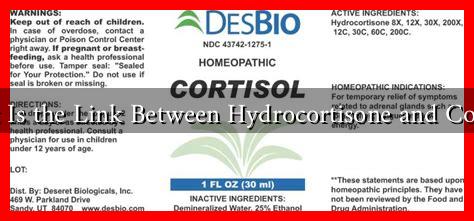-
Table of Contents
What Is the Link Between Hydrocortisone and Cortisol?
Hydrocortisone and cortisol are two terms that often come up in discussions about stress, inflammation, and hormone regulation. While they are closely related, understanding their differences and connections is crucial for anyone interested in health, medicine, or endocrinology. This article delves into the relationship between hydrocortisone and cortisol, exploring their functions, uses, and implications for health.
Understanding Cortisol
Cortisol is a steroid hormone produced by the adrenal glands, which are located on top of each kidney. It plays a vital role in various bodily functions, including:
- Regulating metabolism
- Controlling blood sugar levels
- Reducing inflammation
- Assisting with memory formulation
- Managing stress responses
Cortisol is often referred to as the “stress hormone” because its levels increase in response to stress. This hormone helps the body manage stress by providing the necessary energy and resources to cope with challenging situations. However, chronic high levels of cortisol can lead to various health issues, including anxiety, depression, and cardiovascular diseases.
What Is Hydrocortisone?
Hydrocortisone, also known as cortisol when used in its pharmaceutical form, is a synthetic version of cortisol. It is commonly used in medical treatments to address various conditions, such as:
- Adrenal insufficiency (Addison’s disease)
- Inflammatory conditions (e.g., arthritis, lupus)
- Allergic reactions
- Skin conditions (e.g., eczema, psoriasis)
Hydrocortisone can be administered in several forms, including oral tablets, topical creams, and injections. Its primary function is to mimic the effects of cortisol in the body, helping to reduce inflammation and suppress the immune response.
The Connection Between Hydrocortisone and Cortisol
The link between hydrocortisone and cortisol lies in their chemical structure and physiological effects. Both substances are glucocorticoids, a class of steroid hormones that share similar properties. Here are some key points that highlight their connection:
- Chemical Structure: Hydrocortisone is chemically identical to cortisol, making it an effective substitute for the hormone in therapeutic settings.
- Functionality: Both hydrocortisone and cortisol help regulate metabolism, immune response, and stress reactions.
- Medical Use: Hydrocortisone is often prescribed when the body cannot produce enough cortisol, such as in adrenal insufficiency.
Case Studies and Statistics
Research has shown the importance of maintaining balanced cortisol levels for overall health. For instance, a study published in the Journal of Clinical Endocrinology & Metabolism found that individuals with chronic stress exhibited significantly higher cortisol levels, leading to various health complications. Conversely, patients with adrenal insufficiency who received hydrocortisone therapy reported improved quality of life and reduced symptoms of fatigue and weakness.
Statistics indicate that approximately 1 in 100,000 people are diagnosed with Addison’s disease, a condition that necessitates hydrocortisone treatment. This highlights the critical role of hydrocortisone in managing cortisol levels in individuals who cannot produce enough of the hormone naturally.
Conclusion
In summary, hydrocortisone and cortisol are intrinsically linked through their chemical structure and physiological roles in the body. While cortisol is a naturally occurring hormone essential for various bodily functions, hydrocortisone serves as a synthetic alternative used in medical treatments. Understanding this connection is vital for recognizing the importance of hormone regulation in maintaining health and managing stress. As research continues to evolve, the implications of cortisol and hydrocortisone in health care will undoubtedly expand, offering new insights into their roles in human physiology.




